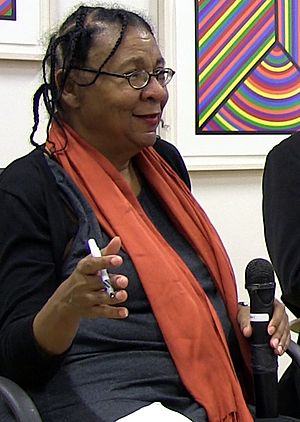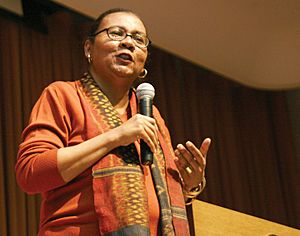- This page was last modified on 31 December 2025, at 23:57. Suggest an edit.
bell hooks facts for kids
|
bell hooks
|
|
|---|---|

bell hooks in October 2014
|
|
| Born |
Gloria Jean Watkins
September 25, 1952 Hopkinsville, Kentucky, U.S.
|
| Died | December 15, 2021 (aged 69) Berea, Kentucky, U.S.
|
| Education |
|
| Occupation |
|
| Years active | 1978–2018 |
| Known for | Oppositional gaze |
|
Notable work
|
|
Gloria Jean Watkins (born September 25, 1952 – died December 15, 2021) was an important American writer, teacher, and activist. She is much better known by her pen name, bell hooks. She taught at Berea College in Kentucky.
bell hooks was famous for her writings about race, feminism (the idea that all genders should have equal rights), and social class (how people are grouped by wealth or status). She explored how these different parts of a person's identity can create unfair systems.
She wrote about 40 books, including essays, poems, and even books for children. Her work covered many topics like love, race, class, gender, art, history, and how the mass media affects us.
She started teaching in 1976 at the University of Southern California. Later, she taught at other well-known universities like Stanford University and Yale University. In 2004, she joined Berea College in Kentucky. There, she started the bell hooks Institute in 2014.
Her pen name, "bell hooks," came from her great-grandmother, Bell Blair Hooks. She chose to write it in lowercase letters to show that her ideas and books were more important than her personal fame.
Early Life and Education
Gloria Jean Watkins was born on September 25, 1952, in Hopkinsville, Kentucky. It was a small town where people of different races were kept separate, known as segregation. Her family was African-American and working-class.
She was one of six children. Her father worked as a janitor, and her mother worked as a maid in white families' homes. In her book Bone Black: Memories of Girlhood, she wrote about growing up in a "magical world of southern black culture."
Gloria loved to read. She enjoyed poets like William Wordsworth and Langston Hughes. She went to racially segregated public schools at first. In the late 1960s, she moved to a school where students of all races learned together.
After high school, she went to Stanford University and earned a degree in English in 1973. She then got her master's degree from the University of Wisconsin–Madison in 1976. During this time, she started writing her famous book, Ain't I a Woman: Black Women and Feminism, which was published in 1981.
In 1983, she earned her doctorate degree in English from the University of California, Santa Cruz. Her main project for this degree was about the author Toni Morrison.
Teaching and Writing Career
bell hooks began her teaching career in 1976 at the University of Southern California. She taught English and ethnic studies. In 1978, her first book of poems, And There We Wept, was published. This was the first time she used her pen name, "bell hooks."
She chose her great-grandmother's name because her great-grandmother was known for being bold and speaking her mind. She used lowercase letters for her name to show that her ideas were more important than her personal identity. She wanted people to focus on "the substance of books, not who [she is]."
In the 1980s and 1990s, bell hooks taught at many universities. These included the University of California, Santa Cruz, Yale University, and Oberlin College. In 1994, she became a distinguished professor at City College of New York.
Her first major book, Ain't I a Woman? Black Women and Feminism, came out in 1981. She had started writing it when she was still in college. This book became very important in feminist thinking. It explored how sexism and racism affected Black women throughout history. It also looked at how Black women were shown in the media and treated in schools.
bell hooks wrote more than 30 books. Her books covered many different topics. She wrote about Black men, masculinity, and even self-help. She also wrote about how to teach in a way that truly helps students learn and think.
In her book Feminist Theory: From Margin to Center (1984), she discussed how the feminist movement sometimes did not include the experiences of Black women. She believed that for feminism to be strong, it needed to include everyone.
She also taught that being able to read, write, and think critically (called literacy) is very important for the feminist movement. Without these skills, people might not see the unfairness in society.
In 2004, bell hooks became a Distinguished Professor in Residence at Berea College. Her 2008 book, belonging: a culture of place, talks about her return to Kentucky. In 2014, the bell hooks Institute was created at Berea College. She gave her writings and papers to the institute in 2017.
While at Berea College, she also helped create the bell hooks center. This center provides a safe space for students who are often left out, especially Black and brown students, queer students, and those from the Appalachian region. The center helps them develop their voices and work for change. It is still active today, offering programs based on bell hooks' ideas about feminism and love.
In 2018, she was honored by being inducted into the Kentucky Writers Hall of Fame.
Personal Life
Buddhism
bell hooks became interested in Buddhism when she was in college. She learned about it through her interest in poetry and meeting a Buddhist poet. She saw Buddhism as a way to find love and spirituality in her life.
She combined Buddhist ideas with her Christian upbringing. This mix of Christian and Buddhist thought influenced her identity, her activism, and her writing for the rest of her life.
She liked Buddhism because it helped her understand and respond to suffering and unfairness, as well as love and connection. She felt that the daily practices of Christian-Buddhism helped her stay focused and grounded.
Buddhist ideas, especially from the teacher Thích Nhất Hạnh, appear in many of bell hooks' essays, books, and poems. Buddhist spirituality also played a big part in her idea of a "love ethic," which became a main focus of her work.
Death
bell hooks passed away on December 15, 2021, at her home in Berea, Kentucky. She was 69 years old and died from kidney failure.
Filmography
- Black Is... Black Ain't (1994)
- care Again (1995)
- Cultural Criticism and Transformation (1997)
- My Feminism (1997)
- Voices of Power (1999)
- BaadAsssss Cinema (2002)
- I Am a Man: Black Masculinity in America (2004)
- Happy to Be Nappy and Other Stories of Me (2004)
- Is Feminism Dead? (2004)
- Fierce Light: When Spirit Meets Action (2008)
- Occupy Love (2012)
- Hillbilly (2018)
Awards and Nominations
- Yearning: Race, Gender, and Cultural Politics: The American Book Awards/ Before Columbus Foundation Award (1991)
- bell hooks: The Writer's Award from the Lila Wallace–Reader's Digest Fund (1994)
- Happy to Be Nappy: NAACP Image Award nominee (2001)
- Homemade Love: The Bank Street College Children's Book of the Year (2002)
- Salvation: Black People and Love: Hurston/Wright Legacy Award nominee (2002)
- bell hooks: Utne Reader's "100 Visionaries Who Could Change Your Life"
- bell hooks: The Atlantic Monthly's "One of our nation's leading public intellectuals"
- bell hooks: TIME 100 Women of the Year, 2020
Images for kids
See also
 In Spanish: Bell hooks para niños
In Spanish: Bell hooks para niños


